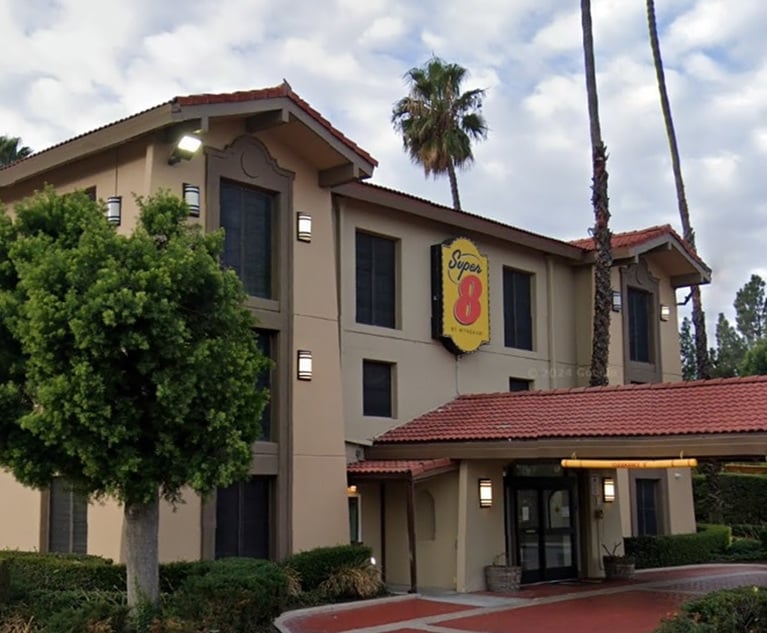SCOTUS Declines to Hear Challenge to New Jersey Bail Reform Law
The challengers said the state's new law, meant to move away from cash bail, violates the constitutional rights of criminal defendants.
October 30, 2018 at 03:01 PM
3 minute read
 U.S. Supreme Court. Photo: Diego M. Radzinschi/ALM
U.S. Supreme Court. Photo: Diego M. Radzinschi/ALM
The U.S. Supreme Court has declined to grant certiorari to a bail bonds underwriter and a criminal defendant challenging the constitutionality of New Jersey's bail reform law.
The court said Monday it would not hear the appeal in Holland v. Rosen, which presented the question of whether a New Jersey law favoring nonmonetary restrictions over monetary bail is an unnecessary restriction of pretrial liberty in violation of the Eighth Amendment, the Due Process Clause or the Fourth Amendment.
The challenge was brought on behalf of Brittan Holland, who was placed under home detention and required to wear an electronic monitoring device while awaiting trial on an aggravated assault charge, and Lexington National Insurance Co., which underwrites bail bonds but saw its business in New Jersey dwindle under the bail reform law.
Holland and Lexington National were represented at the Supreme Court by former U.S. Solicitor General Paul Clement, of Kirkland & Ellis in Washington, D.C. He did not respond to a request for comment.
Holland and Lexington National sought Supreme Court review in the case after U.S. District Judge Jerome Simandle refused to grant a preliminary injunction in the case in a September 2017 ruling, finding the plaintiffs had little chance of winning. The U.S. Court of Appeals for the Third Circuit affirmed that ruling last July. The Third Circuit held that New Jersey's bail reform law did not offend the Eighth Amendment, the Due Process Clause or the Fourth Amendment.
Holland was arrested in April 2017 and charged with aggravated assault for his alleged participation in a bar fight. His suit argued that he likely would have been able to regain his freedom by paying bail under the former system. The Camden County Prosecutor's Office sought his pretrial detention, but then offered to withdraw the motion if he agreed to home detention and to be monitored by an ankle bracelet. Holland agreed.
Clement's petition to the Supreme Court said New Jersey's bail reform act “effectively guaranteed that presumptively innocent individuals will not receive the least restrictive conditions of pre-trial release.” And the Third Circuit ruling recognized that the New Jersey law “necessarily leads to wholly unnecessary pretrial deprivations of liberty, such as imposing house arrest when a monetary bond would suffice, and nonetheless found no constitutional problem.”
The suit stems from a January 2017 revamp of New Jersey's bail system that eliminated cash bail in most cases. The new law was intended to address what was said to be a large number of defendants spending time in jail when they are unable to come up with enough cash to pay modest amounts of bail for low-level offenses.
This content has been archived. It is available through our partners, LexisNexis® and Bloomberg Law.
To view this content, please continue to their sites.
Not a Lexis Subscriber?
Subscribe Now
Not a Bloomberg Law Subscriber?
Subscribe Now
NOT FOR REPRINT
© 2025 ALM Global, LLC, All Rights Reserved. Request academic re-use from www.copyright.com. All other uses, submit a request to [email protected]. For more information visit Asset & Logo Licensing.
You Might Like
View All

Trending Stories
- 1Decision of the Day: Judge Sanctions Attorney for 'Frivolously' Claiming All Nine Personal Injury Categories in Motor Vehicle Case
- 2Second Judge Blocks Trump Federal Funding Freeze
- 3Crypto Hacker’s $65 Million Scam Ends in Indictment
- 4Trump's Inspectors General Purge Could Make Policy Changes Easier, Observers Say
- 5Supporting Our Supreme Court Justices in the Guardianship Part
Who Got The Work
J. Brugh Lower of Gibbons has entered an appearance for industrial equipment supplier Devco Corporation in a pending trademark infringement lawsuit. The suit, accusing the defendant of selling knock-off Graco products, was filed Dec. 18 in New Jersey District Court by Rivkin Radler on behalf of Graco Inc. and Graco Minnesota. The case, assigned to U.S. District Judge Zahid N. Quraishi, is 3:24-cv-11294, Graco Inc. et al v. Devco Corporation.
Who Got The Work
Rebecca Maller-Stein and Kent A. Yalowitz of Arnold & Porter Kaye Scholer have entered their appearances for Hanaco Venture Capital and its executives, Lior Prosor and David Frankel, in a pending securities lawsuit. The action, filed on Dec. 24 in New York Southern District Court by Zell, Aron & Co. on behalf of Goldeneye Advisors, accuses the defendants of negligently and fraudulently managing the plaintiff's $1 million investment. The case, assigned to U.S. District Judge Vernon S. Broderick, is 1:24-cv-09918, Goldeneye Advisors, LLC v. Hanaco Venture Capital, Ltd. et al.
Who Got The Work
Attorneys from A&O Shearman has stepped in as defense counsel for Toronto-Dominion Bank and other defendants in a pending securities class action. The suit, filed Dec. 11 in New York Southern District Court by Bleichmar Fonti & Auld, accuses the defendants of concealing the bank's 'pervasive' deficiencies in regards to its compliance with the Bank Secrecy Act and the quality of its anti-money laundering controls. The case, assigned to U.S. District Judge Arun Subramanian, is 1:24-cv-09445, Gonzalez v. The Toronto-Dominion Bank et al.
Who Got The Work
Crown Castle International, a Pennsylvania company providing shared communications infrastructure, has turned to Luke D. Wolf of Gordon Rees Scully Mansukhani to fend off a pending breach-of-contract lawsuit. The court action, filed Nov. 25 in Michigan Eastern District Court by Hooper Hathaway PC on behalf of The Town Residences LLC, accuses Crown Castle of failing to transfer approximately $30,000 in utility payments from T-Mobile in breach of a roof-top lease and assignment agreement. The case, assigned to U.S. District Judge Susan K. Declercq, is 2:24-cv-13131, The Town Residences LLC v. T-Mobile US, Inc. et al.
Who Got The Work
Wilfred P. Coronato and Daniel M. Schwartz of McCarter & English have stepped in as defense counsel to Electrolux Home Products Inc. in a pending product liability lawsuit. The court action, filed Nov. 26 in New York Eastern District Court by Poulos Lopiccolo PC and Nagel Rice LLP on behalf of David Stern, alleges that the defendant's refrigerators’ drawers and shelving repeatedly break and fall apart within months after purchase. The case, assigned to U.S. District Judge Joan M. Azrack, is 2:24-cv-08204, Stern v. Electrolux Home Products, Inc.
Featured Firms
Law Offices of Gary Martin Hays & Associates, P.C.
(470) 294-1674
Law Offices of Mark E. Salomone
(857) 444-6468
Smith & Hassler
(713) 739-1250








